Pure Moringa, a superfood renowned for its nutritional prowess, stands at the forefront of the health and wellness movement in today’s fast-paced world. As more individuals recognize the significance of nutrition in achieving better health and vitality, Pure Moringa emerges as a key player. This article delves into the myriad benefits of Pure Moringa, showcasing how it can be instrumental in fostering a healthier, more joyful existence.
Introduction
In our quest for better health, we often seek out natural remedies and superfoods that can provide us with the essential nutrients and energy we need. One such superfood that has been making waves in the health and wellness community is Pure Moringa. Derived from the leaves of the Moringa oleifera tree, Pure Moringa is a powerhouse of nutrition that can help you achieve your health and wellness goals. In this article, we will delve into the world of Pure Moringa and uncover its numerous benefits.
Table of Contents
What Is Pure Moringa?
Pure Moringa, often referred to as the “drumstick tree” or “miracle tree,” is a native plant to parts of Africa and Asia. It has been used for centuries in traditional medicine and is revered for its exceptional nutritional content. The leaves, pods, and seeds of the Moringa tree are all edible, but it is the leaves that are most commonly consumed for their health benefits.
Nutritional Powerhouse: Moringa’s Nutrient Profile
Pure Moringa, often referred to as the “drumstick tree” or “miracle tree,” is a native plant to parts of Africa and Asia. It has gained immense popularity due to its exceptional nutritional content, making it a valuable addition to any diet.
One of the key reasons why Moringa is considered a nutritional powerhouse is its rich nutrient profile. Here are some of the essential vitamins and minerals found in Moringa:
- Vitamin A: This vitamin is crucial for maintaining good vision and a healthy immune system. Adequate vitamin A intake supports healthy skin and mucous membranes.
- Vitamin C: Moringa is packed with vitamin C, a powerful antioxidant that plays a vital role in boosting the immune system. It helps the body combat infections and promotes healthy skin.
- Vitamin E: Vitamin E is known for its skin benefits and its role as an antioxidant. It helps protect cells from oxidative damage and contributes to overall skin health.
- Calcium: Moringa contains a significant amount of calcium, which is essential for strong bones and teeth. Adequate calcium intake also supports muscle function and blood clotting.
- Iron: Iron is vital for the production of red blood cells, which carry oxygen throughout the body. Moringa provides a source of dietary iron, particularly beneficial for individuals with iron-deficiency anemia.
- Potassium: This mineral helps regulate blood pressure and fluid balance in the body. Adequate potassium intake supports heart health and proper muscle function.
- Protein: Moringa is unique among plants as it contains all essential amino acids, making it a complete protein source. Protein is crucial for muscle growth, repair, and overall body function.
Incorporating Moringa into your diet can provide these essential nutrients, contributing to better overall health and well-being. Whether consumed as fresh leaves, powdered supplements, or incorporated into various recipes, Moringa’s nutrient profile makes it a valuable superfood choice for those seeking optimal nutrition.
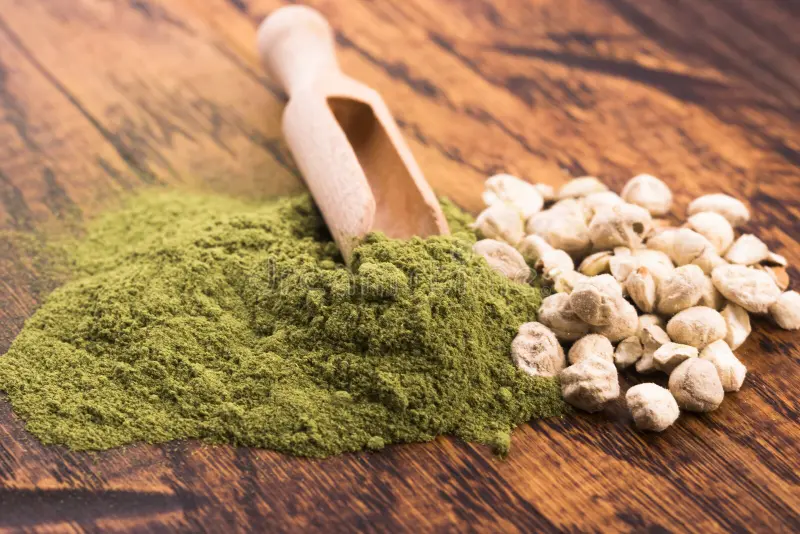
Moringa’s Rich History
The use of Moringa dates back thousands of years, with historical records indicating its use in various cultures for medicinal and nutritional purposes. Ancient Egyptians, Greeks, and Romans all recognized the value of this remarkable plant. In traditional Ayurvedic medicine, Moringa was used to treat a wide range of ailments.
Health Benefits of Pure Moringa
Pure Moringa, derived from the leaves of the Moringa oleifera tree, offers a wide range of health benefits due to its exceptional nutritional content and bioactive compounds. Let’s explore some of the remarkable advantages of incorporating Pure Moringa into your daily routine:
- Boosted Immunity: Pure Moringa is a natural immune system booster. It contains a wealth of vitamins and antioxidants, such as vitamin C and beta-carotene, which help fortify your body’s defenses against infections and illnesses.
- Enhanced Energy Levels: If you often find yourself feeling fatigued, Moringa can provide a natural energy boost. Its rich nutrient content, including iron and B vitamins, supports increased vitality without the need for caffeine or artificial stimulants.
- Improved Digestion: Moringa promotes digestive health in several ways. It encourages the growth of beneficial gut bacteria, aiding in digestion and nutrient absorption. It can also help alleviate common digestive issues like constipation.
- Skin and Hair Health: The vitamins and antioxidants found in Moringa contribute to healthy, radiant skin and strong, lustrous hair. Moringa oil, extracted from its seeds, is often used in skincare products for its moisturizing and rejuvenating properties.
- Anti-Inflammatory Effects: Moringa contains compounds with anti-inflammatory properties, such as isothiocyanates and quercetin. These can help reduce inflammation in the body, potentially benefiting individuals with inflammatory conditions.
- Antioxidant Protection: The antioxidants in Pure Moringa, including quercetin, chlorogenic acid, and beta-carotene, combat free radicals and oxidative stress. This protection helps prevent cell damage and reduces the risk of chronic diseases.
- Balanced Blood Sugar: Some studies suggest that Moringa may help regulate blood sugar levels, making it potentially beneficial for individuals with diabetes or those at risk of developing the condition.
- Nutritional Support: Moringa is a complete protein source, containing all essential amino acids. It also provides essential vitamins and minerals, making it a valuable addition to vegetarian and vegan diets.
- Anti-Aging Properties: The combination of antioxidants and nutrients in Moringa can help slow down the aging process by preventing oxidative damage to cells and tissues.
- Anti-Cancer Potential: While more research is needed, some studies suggest that Moringa may have anticancer properties, thanks to its bioactive compounds that inhibit the growth of cancer cells.
Incorporating Pure Moringa into your diet, whether through fresh leaves, powdered supplements, or culinary creations, can offer a myriad of health benefits. It’s essential to consume it as part of a balanced diet and consult with a healthcare professional if you have specific health concerns or conditions. With its diverse range of advantages, Pure Moringa is a superfood that can contribute to a healthier and happier you.
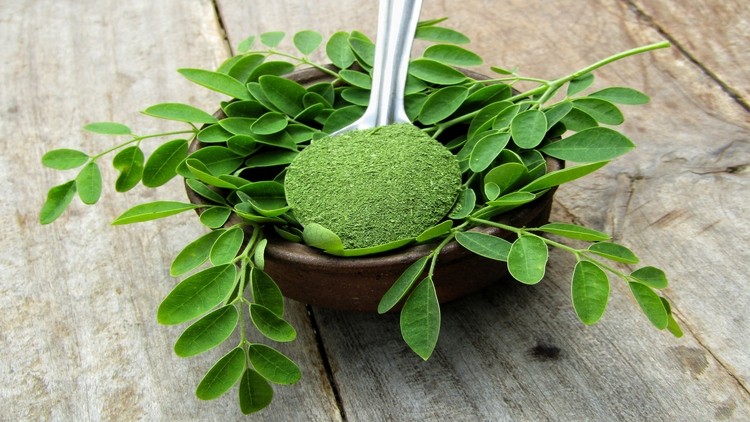
How to Incorporate Pure Moringa into Your Diet
Adding Pure Moringa to your daily diet is easy and can be a delicious way to boost your nutrition. Whether you prefer fresh leaves or Moringa powder, there are various creative and convenient ways to enjoy this superfood. Here are some suggestions:
- Moringa Smoothies: One of the most popular ways to enjoy Moringa is by adding a teaspoon of Moringa powder to your morning smoothie. Combine it with your favorite fruits, yogurt or almond milk, and a touch of honey for a nutritious and refreshing start to your day.
- Moringa Tea: You can brew Moringa leaves to make a flavorful tea. Simply add dried Moringa leaves to hot water, let it steep for a few minutes, and enjoy. You can also add a slice of lemon or a touch of honey for added flavor.
- Moringa Soup: Incorporate Moringa leaves into your homemade soups. Just toss in some fresh Moringa leaves during the last few minutes of cooking to preserve their nutrients. Moringa adds a subtle, earthy flavor to soups.
- Moringa Salad: Sprinkle Moringa powder over your salads for an extra nutritional punch. It pairs well with various greens and can enhance the overall flavor of your salad.
- Moringa Pesto: Create a Moringa pesto sauce by blending fresh Moringa leaves with olive oil, garlic, pine nuts, and Parmesan cheese. This vibrant green sauce can be tossed with pasta or used as a flavorful dip.
- Moringa Snacks: Incorporate Moringa into your snack routine by making Moringa-infused popcorn or roasted chickpeas. Simply sprinkle Moringa powder over your favorite snacks for added nutrition.
- Moringa Guacamole: Upgrade your guacamole by adding Moringa powder. The earthy notes of Moringa complement the creamy avocado, creating a unique and nutritious dip.
- Moringa Breakfast: Stir Moringa powder into your oatmeal, yogurt, or breakfast cereal. It’s a simple way to kick-start your morning with added vitamins and minerals.
- Moringa Dressings: Blend Moringa powder into homemade salad dressings or vinaigrettes. It not only enhances the color but also adds a subtle nutty flavor.
- Moringa Lattes: Create a Moringa latte by whisking Moringa powder into warm milk. Add a touch of honey for sweetness, and you’ll have a soothing and nutritious beverage.
Remember that when cooking with Moringa, it’s best to add it toward the end of the cooking process to preserve its delicate nutrients. Additionally, start with small quantities and gradually increase the amount to suit your taste preferences and dietary needs.
Whether you choose to use fresh Moringa leaves or opt for the convenience of Moringa powder, incorporating this superfood into your daily diet can provide a wide array of essential vitamins, minerals, and antioxidants, contributing to a healthier and more vibrant lifestyle.
Moringa Supplements vs. Fresh Moringa Leaves
When it comes to reaping the benefits of Moringa, you have two primary options: Moringa supplements in various forms (such as capsules or powder) and fresh Moringa leaves. Each has its advantages and considerations, so let’s explore the differences between the two:
Moringa Supplements:
- Convenience: Moringa supplements are incredibly convenient. They come in easily consumable forms, such as capsules or powdered supplements, making it easy to incorporate into your daily routine, especially for those with busy lifestyles.
- Consistency: Supplements offer consistent dosages, ensuring you get a standardized amount of Moringa with each serving. This can be beneficial for those looking for precise nutrient intake.
- Long Shelf Life: Moringa supplements typically have a longer shelf life compared to fresh Moringa leaves, which can spoil relatively quickly. This means you can store them for extended periods without worrying about freshness.
- Portability: Moringa supplements are portable and travel-friendly, making them an ideal choice for individuals who are often on the go.
- Concentration: Supplements often provide a more concentrated dose of Moringa’s nutrients, allowing you to potentially experience quicker and more pronounced health benefits.
Fresh Moringa Leaves:
- Natural Form: Fresh Moringa leaves are in their natural, unprocessed form, preserving the full spectrum of nutrients and antioxidants. This can result in a more comprehensive nutritional profile.
- Flavor and Culinary Versatility: Fresh Moringa leaves have a mild, earthy flavor and can be incorporated into various culinary creations, such as soups, salads, and smoothies, adding both nutrition and taste.
- Fiber Content: Whole Moringa leaves contain dietary fiber, which can aid in digestion and promote a feeling of fullness. This may be preferable for those seeking digestive benefits.
- Hydration: Fresh leaves contain water content, contributing to hydration and overall health. This natural water content can be especially beneficial in hot climates.
- Sustainable: Harvesting fresh Moringa leaves from your own tree or a local source can be a sustainable and environmentally friendly choice, reducing the carbon footprint associated with supplements.
Considerations:
- Availability: The availability of fresh Moringa leaves can vary by location and season. Supplements are generally more accessible and can be purchased year-round.
- Taste Preference: Some individuals may prefer the taste and versatility of fresh Moringa leaves in their meals, while others may find the convenience of supplements more appealing.
- Dosage Control: If you have specific health concerns or dietary restrictions, supplements allow for precise dosage control. However, it’s essential to follow recommended dosages.
- Cost: The cost of fresh Moringa leaves versus supplements can vary. Fresh leaves may be more cost-effective if you have access to a Moringa tree.
In conclusion, the choice between Moringa supplements and fresh Moringa leaves depends on your lifestyle, preferences, and individual health goals. Both options can provide the incredible benefits of Moringa, so it’s a matter of selecting the one that aligns best with your needs and preferences.

Safety and Precautions
While Moringa offers numerous health benefits, it’s essential to consume it responsibly and be aware of potential precautions, especially if you have specific health conditions or are pregnant. Here are some safety considerations and precautions to keep in mind:
- Consult with a Healthcare Professional: Before adding Moringa to your diet, especially in the form of supplements, consult with a healthcare professional. They can assess your individual health status and provide guidance on safe consumption, ensuring it won’t interfere with any existing medications or conditions.
- Moderation is Key: As with any dietary supplement, moderation is crucial. Avoid excessive consumption of Moringa, as very high doses may lead to digestive discomfort, including diarrhea and stomach cramps.
- Quality Matters: When purchasing Moringa supplements or products, choose reputable brands and sources to ensure product quality and safety. Look for products that have been tested for contaminants and adhere to quality standards.
- Allergic Reactions: Some individuals may experience allergic reactions to Moringa. If you notice symptoms such as itching, rash, or swelling after consuming Moringa, discontinue use and seek medical attention.
- Pregnancy and Breastfeeding: If you are pregnant or breastfeeding, it’s crucial to consult your healthcare provider before incorporating Moringa into your diet. While Moringa is generally considered safe, there is limited research on its safety during pregnancy and lactation.
- Anticoagulant Medications: If you are taking anticoagulant medications (blood thinners), be cautious when consuming Moringa, as it contains vitamin K, which can interfere with the effectiveness of these medications. Discuss its use with your healthcare provider.
- Blood Sugar Management: Moringa may help regulate blood sugar levels, which can be beneficial for some individuals. However, if you have diabetes and are taking medication to control blood sugar, monitor your levels closely when adding Moringa to your diet. Adjustments to your medication may be necessary.
- Children: While Moringa is generally safe for adults, its safety in children, especially in supplement form, has not been extensively studied. Consult with a pediatrician before giving Moringa to children.
- Potential Laxative Effect: In some cases, Moringa supplements or excessive consumption of fresh leaves may have a mild laxative effect, leading to increased bowel movements. Start with a small amount to gauge your body’s response.
- Interactions with Thyroid Medications: Moringa may contain compounds that can affect thyroid function. If you have thyroid issues or are taking thyroid medications, discuss Moringa consumption with your healthcare provider.
Remember that individual responses to Moringa can vary, and it’s essential to listen to your body. If you experience any adverse effects or discomfort, discontinue use and seek medical advice. Moringa is a valuable superfood, but responsible and informed consumption is key to reaping its benefits safely. Always prioritize your health and well-being when making dietary choices.
Moringa: A Sustainable Choice
In addition to its remarkable nutritional benefits, Moringa stands out as a sustainable and environmentally friendly choice in the world of superfoods. Here’s why Moringa is celebrated as a sustainable choice:
- Rapid Growth: Moringa trees are known for their rapid growth, often reaching a height of up to 15 feet within a year of planting. This fast growth rate means that Moringa can be harvested multiple times throughout the year, providing a consistent source of nutrition without depleting the environment.
- Low Water Requirements: Moringa is highly drought-resistant and requires minimal water to thrive. In regions with water scarcity, Moringa can be a valuable crop that doesn’t strain local water resources.
- Minimal Land Footprint: Moringa trees have a compact root system, allowing them to be grown in relatively small spaces. This minimizes the need for large tracts of land, making it suitable for both small-scale and large-scale agriculture.
- Nutrient-Rich Leaves: Moringa’s leaves are the most commonly consumed part of the tree, and they are packed with essential nutrients. This means that a small quantity of Moringa can provide a significant nutritional boost, reducing the need for large agricultural fields.
- Reduced Carbon Footprint: Growing Moringa locally and consuming it fresh or as a supplement reduces the carbon footprint associated with transportation. This is especially important as global efforts to reduce greenhouse gas emissions continue to grow.
- Leaves, Pods, and Seeds: Moringa is versatile, as all parts of the tree, including leaves, pods, and seeds, are edible and have nutritional value. This minimizes waste in the harvesting and processing of Moringa.
- Beneficial to Soil: Moringa trees have deep roots that help improve soil quality by preventing soil erosion and enhancing soil fertility. They can also be used in agroforestry practices to provide shade and protection for other crops.
- Local Economic Opportunities: The cultivation and sale of Moringa can create economic opportunities for local communities, especially in regions where it is naturally grown. This can lead to improved livelihoods and reduced dependency on unsustainable practices.
- Sustainable Food Security: Moringa’s availability throughout the year and its resilience to adverse conditions contribute to food security, ensuring a stable source of nutrition for communities even in challenging environments.
- Reduction of Deforestation: By offering a nutritious alternative to traditional, land-intensive crops, Moringa can help reduce deforestation and land degradation, protecting vital ecosystems.
As global awareness of sustainability and environmental conservation grows, Moringa emerges as a shining example of a sustainable superfood. Its ability to thrive in challenging conditions, its minimal environmental impact, and its contribution to local economies make it an environmentally responsible choice for those seeking to enhance their nutrition while supporting a more sustainable planet.
Testimonials: Real People, Real Results
- Susan, 42
“I started taking Moringa supplements a few months ago, and I’ve never felt better. My energy levels have skyrocketed, and I’ve noticed a significant improvement in my skin and hair. It’s become an essential part of my daily routine.” - Mark, 55
“As someone with diabetes, I was searching for natural ways to manage my blood sugar levels. Adding Moringa to my diet has been a game-changer. My glucose readings are more stable, and I’ve even lost some weight in the process.” - Emily, 30
“I’m a new mom, and getting enough nutrients while juggling a busy schedule can be tough. Moringa powder in my morning smoothie has been a lifesaver. I feel more energized and nourished, which is crucial for taking care of my little one.” - David, 50
“I’ve always been health-conscious, and Moringa has become my secret weapon. Not only has it helped me maintain my weight, but it’s also improved my digestion. I recommend it to all my friends.” - Linda, 60
“I’ve been dealing with arthritis for years, and the pain was getting unbearable. Since I started taking Moringa supplements, I’ve experienced less inflammation, and my joints are more flexible. It’s given me a new lease on life.” - Carlos, 28
“Being an athlete, I’m constantly looking for ways to optimize my performance. Moringa has been a fantastic addition to my diet. It helps with muscle recovery, and I recover faster after intense workouts.”
These testimonials illustrate how Pure Moringa has made a positive impact on real people’s lives. While individual experiences may vary, the consistent theme is that Moringa has contributed to improved energy, better overall health, and a greater sense of well-being. If you’re considering adding Moringa to your diet, these testimonials provide real-life examples of the potential benefits you may experience. However, it’s essential to consult with a healthcare professional before making significant dietary changes, especially if you have specific health concerns or conditions.
Source to Get Organic Moringa Leaf Powder Capsules
FAQs About Pure Moringa
Is Moringa safe for pregnant women?
Pure Moringa is generally safe for pregnant women when consumed in moderation. However, it’s advisable to consult with a healthcare professional before adding any new supplement to your diet during pregnancy.
Can Moringa help with weight loss?
Moringa is not a miracle weight loss solution, but its nutritional value and potential to boost metabolism can support a healthy weight management plan.
What is the recommended daily dosage of Moringa?
The recommended daily dosage of Moringa can vary depending on the form (powder, capsules, leaves) and the individual’s health needs. It’s best to follow the manufacturer’s guidelines or consult a healthcare professional.
Are there any side effects of Moringa?
While Pure Moringa is generally safe, some individuals may experience mild digestive issues when first incorporating it into their diet. Start with a small dose and monitor how your body reacts.
Where can I purchase high-quality Pure Moringa products?
You can find high-quality Pure Moringa products from reputable health food stores, online retailers, and certified suppliers. Ensure the product is sourced from a reliable and
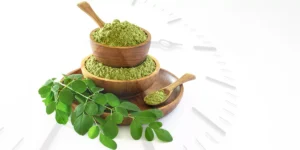





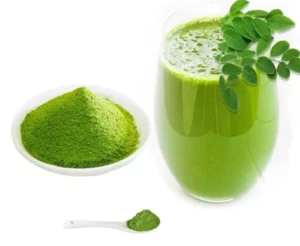



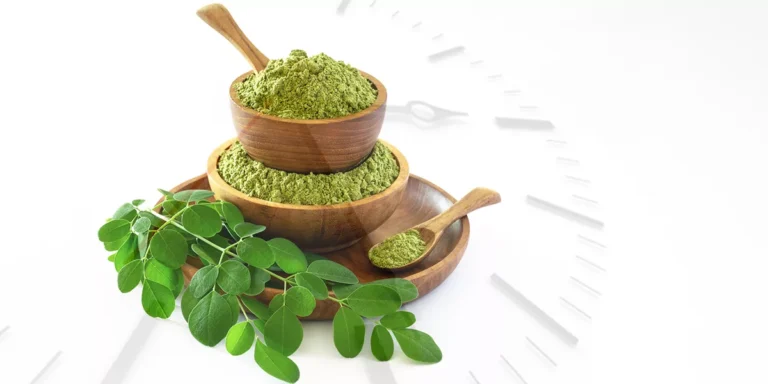
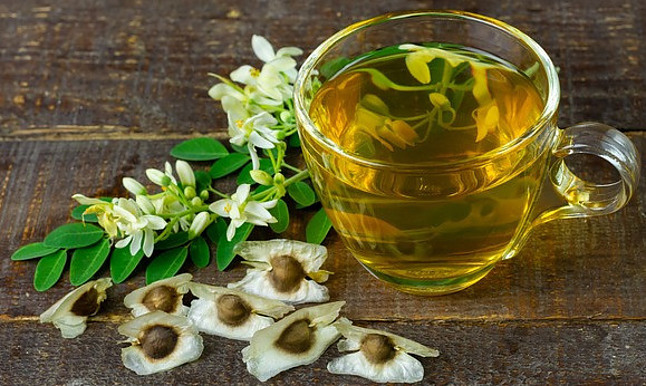
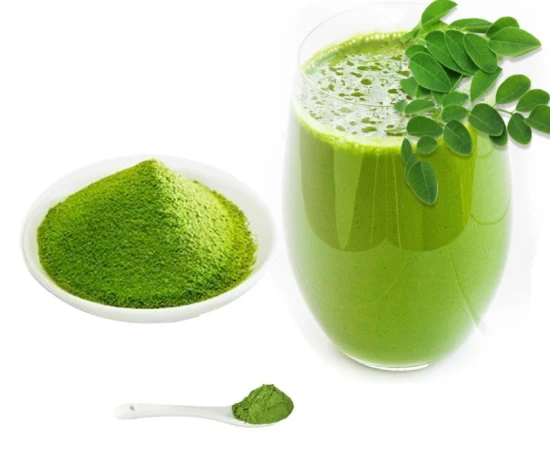




+ There are no comments
Add yours